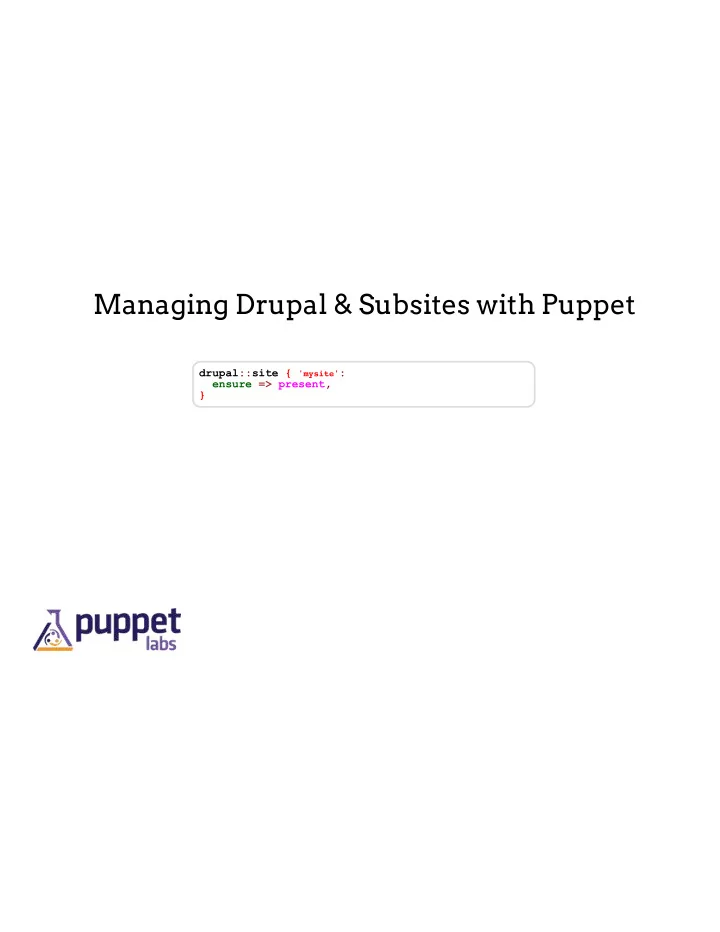

Managing Drupal & Subsites with Puppet drupal::site { 'mysite' : ensure => present, }
Setting the Scene Starting a new project Think about your workflow when setting up a workspace for a new project Some existing approaches: mkdir -p sites/newsite.com/{files,modules,themes,...} Drawbacks Sure everything will just work the same... Oh wait, what version of PHP did you say you're running? Ok, let's try downgrading the date module...
Setting the Scene Starting a new project Think about your workflow when setting up a workspace for a new project Some existing approaches: Start from scratch: Step 1: boot new virtual machine Step 2: install apache, mysql, php Step 3: ??? Step 4: Profit! Drawbacks:
I forgot to bump up the PHP memory_limit !
Setting the Scene Starting a new project Think about your workflow when setting up a workspace for a new project Some existing approaches: #! /bin/sh yum install apache php php-gd mysql wget http://ftp.drupal.org/files/projects/drush-7.x-5.9.tar.gz tar -xvzf drush-7.x-5.9.tar.gz echo "alias drush='php ~/drush/drush.php'" >> ~/.bash_profile source .bash_profile cd /var/www/html drush dl drupal drush site-install standard --account-name=admin --account-pass=admin \ --db-url=mysql://drupal:p@ssword@localhost/drupal echo "Don't forget to make php.ini updates!"
Overview A better workflow: binford2k:~ ben$ vagrant up clientXXX binford2k:~ ben$ vagrant ssh [root@clientXXX ~]# puppet puppet agent -t [...] notice: /Stage[main]//Node[default]/Drupal::Site[mysite.example.com]/ensure: created notice: /Stage[main]//Node[default]/Drupal_module[token]/ensure: created notice: /Stage[main]/Apache/Service[httpd]/ensure: ensure changed 'stopped' to 'running' notice: /Stage[main]/Apache/Service[httpd]: Triggered 'refresh' from 2 events notice: Finished catalog run in 17.02 seconds
Overview Three main topics of my talk Puppet enables a more efficient workflow Quick primer on using the Puppet language Using Puppet to manage Drupal sites
Puppet Workflow
Infrastructure as Code Executable Documentation class someclient { include apache, mysql, drupal drupal::site { 'someclient.com': ensure => present, } user { 'backup': ensure => present, home => '/var/spool/backups', managehome => true, } }
Declarative Model Describe the state you want.
Maintaining State You provision a node. Puppet configures it. Puppet maintains the desired state.
Puppet Language Primer
Puppet Resources Resources are building blocks. They can be combined to make larger components. Together they can model the expected state of your system.
Resource Abstraction Layer Provides a consistent model for resources across supported platforms.
Puppet Classes Classes define a collection of resources that are managed together as a single unit. # /etc/puppetlabs/puppet/modules/ssh/manifests/init.pp class ssh { package { 'openssh': ensure => present, } file { '/etc/ssh/sshd_config': ensure => file, owner => 'root', group => 'root', mode => '0644', source => 'puppet:///modules/ssh/sshd_config', require => Package['openssh'], } service { 'sshd': ensure => running, enable => true, subscribe => File['/etc/ssh/ssh_config'], } }
Modules Modules are directories that contain configuration. Designed to encapsulate everything related to a given configuration They have a hierarchy convention that enable the following: auto-loading of classes file-serving for templates and files auto-delivery of custom Puppet extensions easy sharing with others
Node Definitions Multiple classes are declared together to represent a role. For example, to build a web application on oscar.example.com : node 'oscar.example.com' { include ssh include apache include mysql include web-app }
Learning More Many resources available for learning Learning Puppet tutorial http://docs.puppetlabs.com/learning/ Seriously, go there Training classes http://puppetlabs.com/training/ Fundamentals Advanced Extending Puppet IRC and all that jazz #puppet http://groups.google.com/group/puppet-users
Managing Drupal With Puppet
Managing Drupal A Drupal install consists of: Running services A webserver A database Packages installed services and dependencies PHP, extensions, and dependencies Drupal itself Drush (for sanity's sake) Configuration docroot settings.php php.ini sites/*
Managing Drupal But don't reinvent the wheel Module enables management of multisite Drupal Manages package and configuration of default instance Resource types subsites variables modules themes Configuration customize many aspects of site
Managing Drupal Getting the module http://forge.puppetlabs.com/binford2k/drupal [root@training ~] puppet module search drupal Searching http://forge.puppetlabs.com ... NAME DESCRIPTION AUTHOR KEYWORDS binford2k-drupal This is a module that allows.. @binford2k cms www drupal web ... [root@classroom modules]# puppet module install binford2k/drupal Preparing to install into /etc/puppetlabs/puppet/modules ... Downloading from http://forge.puppetlabs.com ... Installing -- do not interrupt ... /etc/puppetlabs/puppet/modules └─┬ binford2k-drupal (v0.0.2) ├─┬ puppetlabs-apache (v0.6.0) │ └── puppetlabs-firewall (v0.3.0) └── puppetlabs-mysql (v0.6.1)
Managing Drupal Using the module to manage Drupal node 'clientXYZ.dynamic.vm' { include apache, mysql host { 'mysite.example.com': ensure => present, ip => $::ipaddress, } class { 'drupal': managedatabase => true, } drupal::site { 'mysite.example.com': database => 'mysite', dbuser => 'myuser', admin_password => 'derple', managevhost => true, managedatabase => true, } drupal_module { 'mysite.example.com::token': ensure => present, } }
Managing Drupal Using the module to manage Drupal
Managing Drupal See it in action
Conclusion
Recap Three main topics of my talk Puppet enables a more efficient workflow describe what you want let Puppet figure out how to make it happen you do something that builds value Quick primer on using the Puppet language http://docs.puppetlabs.com/learning/ http://puppetlabs.com/training/ Using Puppet to manage Drupal sites puppet module install binford2k/drupal
Questions? Thanks for coming!
Recommend
More recommend